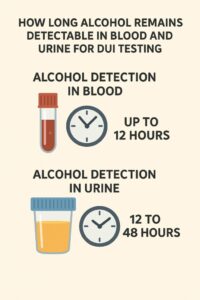Facing a DUI charge can be stressful, and one of the first questions many people have is how long alcohol stays in the body. Knowing the detection times for blood and urine tests can help you understand what to expect from the results. An Austin DWI lawyer can explain how these tests work and what the results might mean for your case. Alcohol affects everyone differently, so detection times are not the same for each person. Understanding the basics can help you make informed decisions and protect your rights.

How the Body Processes Alcohol
When you drink, alcohol enters your bloodstream and begins to affect your body almost immediately. Your liver works to break it down at an average rate of about one standard drink per hour. Factors like your weight, age, gender, and whether you have eaten can all change how quickly alcohol is processed.
Alcohol Detection in Blood
When it comes to DUI cases, blood tests are one of the most reliable ways to measure alcohol in your system. Here is what you should know about how alcohol is detected in blood.
How Blood Tests Work
Blood tests measure the actual amount of alcohol circulating in your bloodstream at the time of the test. They are often used in legal settings because they provide an accurate snapshot of your blood alcohol content.
Typical Detection Window
Alcohol is usually detectable in blood for up to 12 hours after drinking, depending on how much you consumed. Some heavy or chronic drinkers may have slightly longer detection times, but most people will test negative after this window.
Factors that Affect Detection
Your metabolism, body weight, gender, and overall health all influence how quickly alcohol leaves your blood. Eating before drinking or taking certain medications can also affect how long alcohol remains detectable.
Importance in DUI Cases
Blood alcohol levels at the time of testing are critical evidence in DUI charges. Understanding detection windows can help you and your trusted lawyer assess the timing and circumstances of the test.
Alcohol Detection in Urine
Urine tests are another common way to detect alcohol, and they work differently from blood tests. Here’s what you need to know about how alcohol shows up in urine.
How Urine Tests Work
Urine tests measure the byproducts of alcohol as your body breaks it down, rather than the alcohol itself. This makes them useful for detecting alcohol a little longer after drinking compared to blood tests.
Typical Detection Window
Alcohol is generally detectable in urine for 12 to 48 hours after drinking. Specialized tests like EtG can sometimes detect alcohol for up to 80 hours, depending on the amount consumed and individual factors.
Factors that Affect Detection
Hydration, metabolism, body weight, and how much alcohol was consumed all play a role in how long it remains detectable. Drinking water or exercising may slightly affect the results, but will not immediately eliminate alcohol from the urine.
Importance in DUI Cases
Urine tests can provide supporting evidence in DUI investigations, especially when blood tests are not available. Knowing how long alcohol stays detectable can help your chosen lawyer evaluate your case and advise you on the next steps.
Other Testing Methods
In addition to blood and urine tests, breath tests are commonly used to quickly measure alcohol levels. They provide an immediate reading of your blood alcohol content, which is why officers often use them at the scene of an incident. Hair tests are less common but can detect long-term alcohol use over several months.
Factors That Can Affect Detection Times
Several factors can influence how long alcohol stays detectable in your body. Understanding these can help you see why detection times vary from person to person.
Body Composition and Metabolism
People with higher body fat percentages may process alcohol more slowly, while those with faster metabolisms eliminate it quickly. Age and overall health also play a role in how efficiently your body breaks down alcohol.
Amount and Type of Alcohol Consumed
The more alcohol you drink, the longer it will stay in your system. Different types of drinks can affect absorption rates, with drinks that are higher in alcohol content generally taking longer to metabolize.
Hydration and Diet
Being well-hydrated may slightly dilute alcohol in the bloodstream, but it does not accelerate its elimination. Eating food before or during drinking can slow alcohol absorption, which can change how quickly it shows up in tests.
Medications and Health Conditions
Certain medications and medical conditions can interfere with how your body processes alcohol. Liver function, in particular, is crucial since the liver is the primary organ responsible for metabolizing alcohol.
Why Detection Times Matter in DUI Cases
Detection times are critical because they help determine your blood alcohol content at the time of testing. Understanding how long alcohol stays in your system can affect the timing and strategy of a DUI defense. An experienced DWI lawyer can use this information to protect your rights and build a stronger case.
Conclusion
Knowing how long alcohol remains detectable in blood and urine can help you understand what to expect during DUI testing. Everybody processes alcohol differently, so it is vital to be aware of the factors that can influence detection times. An Austin DWI lawyer can guide you through the legal process and help protect your rights if you are facing a DUI charge.